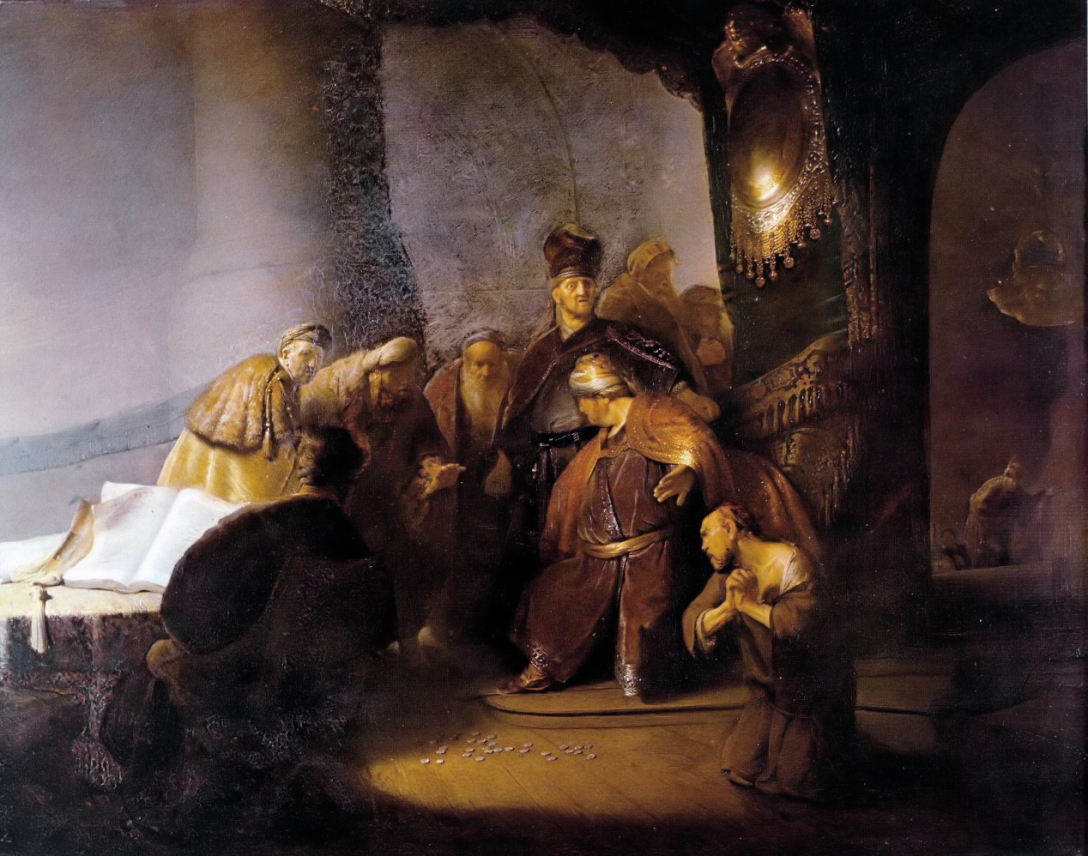Holy Wednesday (Spy Wednesday) Isaiah 50:4-9, Psalm 68(69):8-10,21-22,31,33-34, Matthew 26:14-25
To think that Judas would betray Jesus for 30 pieces of silver is absolutely unbelievable, because I do it every day for free.
If only temptation were such a clear exchange, with the goods delivered up-front. We could negotiate the wages of sin to get the best price. Just how much is the devil asking of me to close myself off from the Lover of my soul?
Perhaps God would supply a counter-offer: Get a promotion at work for a year of Sunday Masses. Keep clear of lust and get a perfect marriage. Cut off slander and gossip and people will esteem you.
Judas is more fortunate than us. He gets the reward for his betrayal up front, but we are always short-changed. The devil is a liar, the scripture calls him the father of lies, and his lie to us is that the wages of sin are not death after all. This is despite the warnings the dim recesses of our consciences and even our bodies give us. Indulging every appetite makes us unwell. Doing whatever we want to other people makes us pariahs. Living for money sacrifices our families and scalps our communities. Neglecting the worship of God leaves us deprived of hope. Our nature is not quite so marred by sin that we cannot see that our wilful wanderings are not going to take us anywhere good.
Even Judas’ conscience is repulsed by what he has done. Perhaps he never thought it would come to this. Perhaps he thought Jesus would be exonerated in the end. But when he learns that Jesus has been condemned to death he returns to his co-conspirators, begging them to take the money back.
I have sinned. I have betrayed innocent blood.
What is that to us? That is your concern
And then Matthew tells us that he hanged himself.
This is a bitter ending to Judas’ story. I suppose some part of us may see it as a comeuppance, but beneath whatever morbid satisfaction it might give the reader something profoundly disordered has occurred here. Judas, in this moment of clarity returns to the priests, those entrusted with the task of administering the Law of God handed down to Moses and in the temple responsible for ministering the propitiatory sacrifices of the old covenant. Bearing false witness is a breach of the ninth commandment. The one who breaks this commandment must be tried by the priests and judges according to Deuteronomy 19, and they must mete out the punishment that was intended for the falsely accused. But the Priests have instead joined a conspiracy to murder an innocent man, and Judas has become an accessory to their crime, and clearly a disposable one at that. Instead of the rightful justice of the Old Covenant mediated by the Priesthood, Judas is cast out to face his own judgement, and his own judgement is without pity and without an advocate.
He dies as one utterly accursed by God according to Deuteronomy 21. He shares the fate of the vile Haman, recounted in the book of Esther, who conspired to eradicate the people of God in the Persian empire. How curious it is that Judas shares in this small way in the death of Christ – hanging from a tree. What a bitter thing that he was left to judge himself.
Alas, indeed, for that man by whom the Son of Man is betrayed!
Better for that man if he had never been born!
When Jesus rises from the dead he goes looking for his disciples, and he greets them in gentleness, in lowliness, as a father soothing his children. He is tender to Mary in the garden. He spends the evening walking with the two on the road to Emmaus. He lets Thomas touch his wounds. He calls Peter away from his fishing nets once again. But there is no reconciliation we can read about for Judas. The Law of God certainly condemns him for his part in the great and dreadful day that saw the Son of Man die as a common criminal and he met an ending suitable enough. But Jesus instituted a new covenant in his blood, one which could do what the old never could. A covenant that would, patterned after Christ, see God dwell in human flesh again by his Spirit.
One lesson we might draw from Judas is to never betray Jesus, to tough up and stick it out through temptation. This is a good lesson. Be brave and be strong, because what God has for you I promise will be better than anything else.
But learn the lesson also of Judas’ silence. You do not have to be alone in your guilt. When Jesus rose from the dead he could have justly condemned all those disciples who had abandoned him. But his word to them was “Go and make disciples”. His judgement will not be as hash as your own.

